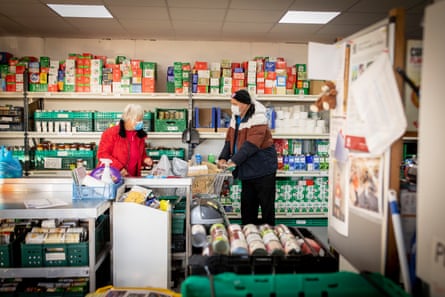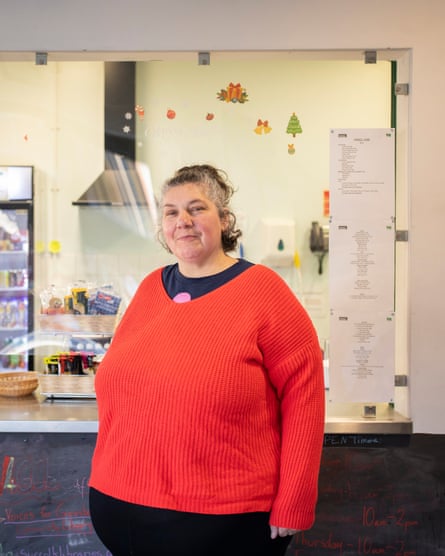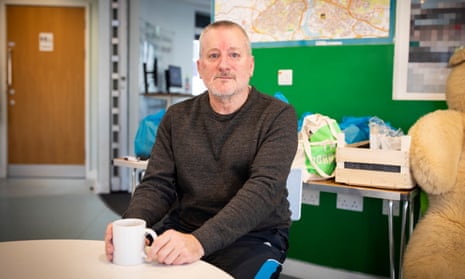A few weeks ago, when the black mould began creeping up the walls of her house again, Carla Francesca, 41, started to search for places she could escape to with her two-year-old daughter. For a few hours, at least, they would be able to avoid the damp and the smell of mildew.
On Thursday, she spent some of the morning at the Gainsborough library in south-east Ipswich, in one of the city’s newly designated warm banks. The modern building is kept heated to 21C; its cafe offers free hot drinks and has a welcoming smell of toast. It feels like a healthier and more cheerful place than her home, where she has been keeping the heating off during the day to save money, and has experimented with keeping some of the windows open in an attempt to stop the spreading mould.
A decade ago, food banks were an unfamiliar concept but by last winter, the country’s largest food bank supplier, the Trussell Trust, was delivering 2.2m emergency parcels. With a cost of living crisis intensifying, food banks are being supplemented this year with the new austerity innovation – a free space anyone can visit to avoid getting cold at home, at a time when turning on the heating has become unaffordable for many.
It might be tempting to dismiss warm banks as a gimmick, not just a rebranding of existing services but a politically smart way for councils and charities to highlight that they are being forced to respond to rising costs. But the people running the thousands of venues are taking them very seriously. Analysis by the Joseph Rowntree Foundation suggests that 4.3m households have already curbed their spending on heating this year. Councils all over the country are working with charities to set up warm spaces in theatres, museums, cathedrals, fire stations and cafes.

At a glance, Gainsborough library looks just like any other library, and many of the people in the cafe know nothing about the warm bank initiative, but the staff here are proving a new kind of support in a subtle way and their approach seems to be working. People come in to print out a document and stay in the cafe for hot drinks. Rails of free clothes (known as “kindness racks”) are available for visitors to choose whatever they want. On Thursdays, library staff and volunteers pack up bags of pears, potatoes, bananas, apples, peppers and carrots, and sell them for the reduced price of £2. Cartons of free period products have been slotted in between book displays on the library shelves, to make it easy for people to help themselves.
There was a calm and friendly atmosphere on Thursday, but some of the visitors were very acutely in need. One woman came in with her daughter, 10, (who said she was off school because she missed the bus), and explained very straightforwardly that she was there to use the free internet access on the library computers, hoping to sell some of her belongings because she was short of money as a result of recently becoming re-addicted to crack cocaine, after managing to not use it for 15 years. Her daughter was very hungry, and happily ate free soup and toast offered by volunteers. Staff invited them back for a Christmas party at the library later in the month.
“No one’s going to come if it’s just a warm space. You wouldn’t want to say: ‘I’m going there to keep warm’ because of the stigma,” says the library’s manager, Mandy Grimwood, explaining that the library’s warm bank model is about getting people to visit the building for neutral reasons – using the computers or the free wifi – and encouraging them to stay. “We’re totally nonjudgmental. Anyone can come in and do anything they like. We’re not going to say: ‘Shh – this is a library.’”

Several visitors said they were in stable jobs and were stopping by to pick up the subsidised food bags. “A lot of people who weren’t struggling before now say they’re finding things hard. We’re seeing twice as many coming in for the popup food shop,” says Grimwood. A year ago, the library sold about 20 bags a week to visitors; this year it’s selling about 45, and has started doing cut-price bags of soap, shampoo and deodorant once a month. “It’s people of all ages. They’re really honest – they tell the volunteers they’re struggling. We’re regularly referring people to the food bank when they tell us they have no food.”
At the Find food bank, a few hundred metres down the road, volunteers are also busy preparing regular food parcels and Christmas hampers (with about 1,000 due to be delivered to Ipswich families). “We’ve noticed that the just-about-managing families we used to hear so much about have slipped under the line and are now not managing, and the families who were managing are slipping into just managing,” says Annie Porter, a long-term volunteer. “We’d be happy if we never had to pack up another food parcel, but the numbers are going up faster every year.”
By midday about half the library cafe’s 16 tables and chairs are taken. Suffolk has had its first frost of December that morning, and most people comment as they walk in on how cold it is outside and how cosy it feels inside the building. All 45 of the county’s libraries, run by the Suffolk Libraries charity since 2011, have classified themselves as warm rooms – “warm and welcoming places where anyone can come during the colder months”. Ipswich’s town hall and several sports centres are also offering spaces where people can gather if they can’t afford to heat their homes sufficiently during the day.
Bristol’s Labour mayor, Marvin Rees, anticipated the need for warm banks in June, announcing: “It almost sounds like wartime, but we’ll be working with community organisations to set up warm places that people can go to if they need to, come the autumn.” In July, the financial journalist and money adviser Martin Lewis wrote: “Can’t believe I’m writing this, but I wonder if this winter we’ll need ‘warm banks’, the equivalent of ‘food banks’, where people who can’t afford heating are invited to spend their days at no cost with heating.”

The initiative has been greeted simultaneously as brilliant and horrifying. Some people have been dismayed by the cheerfully practical promotion of warm banks as a hopeful, we’re-all-in-it-together community response to the cost of living crisis. They view the creation of emergency places where people can huddle to keep warm as something much more dystopian and depressing.
Others point out that had austerity funding cuts not forced local councils to shut down so many community centres over the past decade (such as the more than 500 children’s centres that closed in England between 2010 and 2018) then officials would not be having to scrabble together such idiosyncratic lists of places where people can escape the cold. The Local Government Association, which represents councils in England, points out that ideally the benefits system would provide a safety net for low-income households to actually meet their living costs.
“It does baffle me that both my partner and I are in full-time work, and I still come here every week for the fruit and vegetables,” says Libby, 23. She and her mother and grandmother are all buying the large £2 bags of fresh food, and stop in the library cafe for a cup of tea.
She finished a degree in musical theatre last year, and is working as a supervisor at a restaurant, on £9.50 an hour minimum wage. “I’m not earning enough yet to start paying back my student loan. We’re renting privately and everything feels expensive.” She and her partner turn the heating on for just an hour a day at 10.30pm to make the house warm before they go to sleep, and for the rest of the time she wraps herself in a fluffy yellow blanket; she appreciates day shifts at work, which allow her to spend the day in the warm.
Her grandmother says she and her husband, both retired, are also increasingly careful about the length of time the heating is left on. “We cover up under a couple of blankets, and cuddle up together. We’re very conscious about the money.”

Sarah Woolven, 46, who used to volunteer at the cafe, says she puts on extra jumpers at home, and a kaftan on top of these layers, but hates the way the chill of an unheated building worsens her sciatica. “There’s no embarrassment about spending time here, because it’s so friendly,” she says.
Few of the people who spend time in the cafe go through to borrow books, although the library staff are busy creating library cards for reception classes at the local primary school. A lot of books are reserved by email, with many local readers popping in to collect cosy crime novels or displaying an escapist enthusiasm for the US crime writer Jeffery Deaver and the young adult writer Colleen Hoover. A copy of Be Your Own Therapist: Boost Your Mood and Reduce Your Anxiety in 10 Minutes a Day is waiting for collection.
“We’re not pushing books on people,” says Grimwood, adding that she wants people to feel welcome to come in to just use the library’s electricity to charge their phones for a while. If they feel inclined to stay to join the Men Can Talk group, or join evening table tennis and indoor curling games, so much the better.
Grimwood says that, having worked as a librarian in Suffolk for 30 years, she is no longer disturbed by the intensity of the difficulties some visitors are experiencing, although some volunteers are more easily upset by the very visible needs of some of the children who come in. “You can tell the people who are struggling financially. One woman often comes in and spends most of the day here. She’ll ask us: ‘Have you got any spare food. Is there anything spare?’”
About 30 winter coats were taken from the rail last month. “We haven’t had clothes rails until this autumn,” Grimwood says. “In the past we’ve occasionally done 10p jumble sales, but there wasn’t much interest. This year there seems to be a real need. People keep asking: ‘Are you sure I can really take this?’ There were quite a lot of school uniforms, which went very quickly.”
Several visitors are very upset when they describe their difficulties with heating their homes. Most struggle to put a precise figure on how much more they are paying, articulating general unease that the £5 or £10 top-up payments made from phones to the gas and electricity smart meters seem to be running down much more swiftly. Michael Thompson, 57, a former NHS cleaner, says he is noting down the daily consumption on his meter to calculate how much heating his home actually cost. The library is a useful place to “warm up with a cup and have a chat”, he says. “When you’re at home alone it can be lonely.”

Carla Francesca says she is very worried about the damp and mould spreading through her house. Periodically she sprays it and bleaches it, removes the stained wallpaper and tries to cover the black patches with two layers of new, dry paper. The musty smell is still noticeable the moment you step inside. “It’s coming up everywhere – behind the skirting boards, around the windows. I had to move my daughter’s cot because the mould spread from the cot to some of her toys,” she says. “It would help to have the heating on longer, but it’s just so expensive.”
(After the Guardian sent images of the mould patches, an Ipswich borough council spokesperson said: “We didn’t know that the tenant had a current mould problem. Now that we are aware, we have arranged for a surveyor to visit the property next week to explore what can be done.”)

Francesca says it is a relief to spend some time in the cafe, and stops to talk to the librarian about getting new library cards for her older children, who are in primary school. She is annoyed that the council did not take her concerns about the mould seriously (“They told me not to dry clothes inside, but that’s not what’s causing the problem”), but she is careful to point out that her family’s difficulties are relatively minor, compared with other people’s. She has been putting money aside to buy gloves and hats for Ipswich’s homeless population, and plans to donate the clothes her children have outgrown to the library’s clothes rail.
“We’re really lucky,” she says. “My partner is in full-time work, so there are people a lot worse off than us. It’s hard for everyone, isn’t it?”
